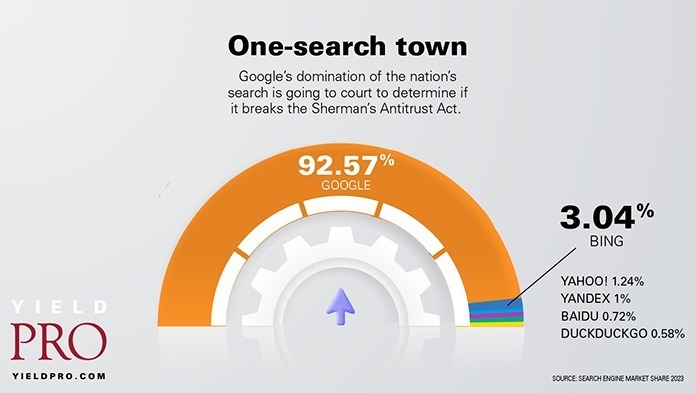Warm weather regularly signals the time to move for many marked by a precipitous increase in Google searches for apartments. There were over 6 million searches for the word apartment nationally in May 2022 alone. The number of online apartment searches have grown dramatically over the last decade creating a singular path to market for apartment operators. Needless to say, online search is greatly connected to the business of leasing and maintaining apartments.
Three years ago, the Justice Department filed suit against the search-engine, Google, alleging it created a monopoly in online search and related advertising markets. Google currently holds 93 percent market share in search through restrictive agreements with Apple, Mozilla, Samsung, Verizon and others. The case begins trial in September in Washington on allegations of violating the Sherman Antitrust Act.

The U.S. government contends that the deals have resulted in making Google the default search engine on most U.S. phones. Google’s agreements with Android-based mobile manufacturers precludes companies from pre-installing or promoting rival search engines on their phones when they’ve opted to take a cut of Google’s search revenue.
The Justice Department argues that such deals prevent rivals from being able to compete in the search market, giving Google anticompetitive scale. Because search is by nature algorithmic across big data, this also precludes other search companies from improving their product by virtue of market share feedback.
Google’s dominance means that it does not have to complete for market share and thus does not need to improve its product. It can raise its prices for advertising without fearing competition and it stifles innovation across the market.
Google has responded that its partners are not coerced, it is simply the best search engine on the market and, when given a choice, users choose Google. Users can change the default search engine at any time but elect to remain with Google. The company states that it’s not a matter of exclusionary practices but of superior product.
If Google loses, most experts believe that the company will remain intact. Instead, it is more likely that U.S. District Judge Amit Mehta will order new rules around how Google conducts business. Specifically, this will target Google’s ability to pay manufacturers to make its search engine the default on their phones—an arrangement that sends billions of dollars to Apple, as one example.
In 1998, Microsoft was the last tech monopoly to be sued, that case over its attempt to control internet browsers on its Windows computers. Microsoft lost the case, opening the way for rivals such as Google Chrome, Firefox and Opera to move into the space.
Closing arguments and final judgement in the case are expected next year but, along with the penalty phase, the final outcome may be years into the future.













